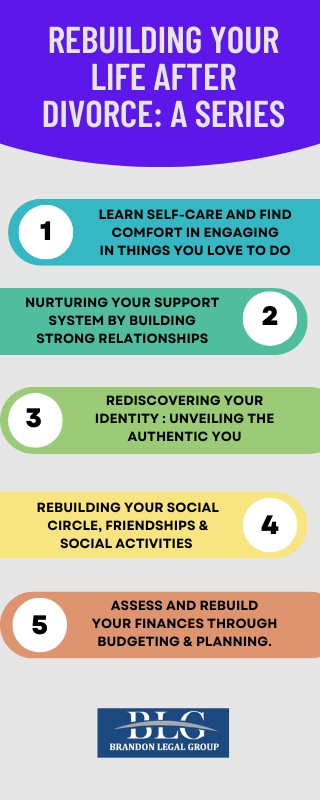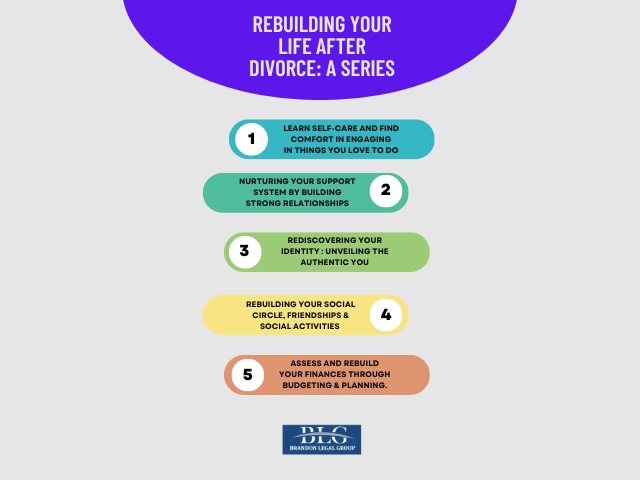 Divorce is a life-altering event that can shatter even the strongest foundations. The journey of moving forward after divorce is often challenging, but it’s crucial to remember that it’s also an opportunity for growth, self-discovery, and a chance to create a new chapter filled with happiness and fulfillment. This article serves as a guide to help individuals navigate the tumultuous waters of divorce and emerge on the other side with a renewed sense of purpose and hope.
Divorce is a life-altering event that can shatter even the strongest foundations. The journey of moving forward after divorce is often challenging, but it’s crucial to remember that it’s also an opportunity for growth, self-discovery, and a chance to create a new chapter filled with happiness and fulfillment. This article serves as a guide to help individuals navigate the tumultuous waters of divorce and emerge on the other side with a renewed sense of purpose and hope.
The Emotional Rollercoaster of Divorce
Divorce often ushers in an emotional roller coaster characterized by a mix of grief, relief, uncertainty, and adjustment as individuals navigate the complexities of separation and embark on a journey of self-discovery and healing.
The following is a dramatization and not an actual event: Emily and Mark had been married for over a decade. They had built a life together, shared dreams, and weathered countless storms. However, the challenges grew insurmountable, leading to their eventual divorce. Emily, found herself grappling with a mix of emotions – sadness, anger, and a profound sense of loss. Mark, her spouse also experienced his fair share of emotions, oscillating between guilt, regret, and a desire for a fresh start.
Seeking Guidance After Divorce: Healing Through Professional Support
After the tumultuous journey of divorce, seeking guidance and support from professionals can be instrumental in facilitating healing and renewal. While friends and family play a vital role, trained therapists, counselors, and support groups can offer specialized assistance to help individuals navigate the emotional aftermath of divorce. Seeking guidance after divorce through therapists, support groups, life coaches, financial advisors, and legal professionals can provide invaluable support on the journey of healing and renewal. Consider the following avenues for seeking professional guidance:
- Therapists and Counselors: Trained therapists and counselors specialize in helping individuals process their emotions, develop coping strategies, and gain insights into their thoughts and behaviors. They provide a safe and non-judgmental space for individuals to explore their feelings and challenges related to divorce.
- Support Groups: Support groups bring together individuals who have experienced divorce, creating a sense of community and shared understanding. These groups offer a platform to share stories, exchange advice, and receive encouragement from others who are on a similar journey.
- Life Coaches: Life coaches provide guidance in setting goals, making positive changes, and moving forward with purpose. They can help individuals develop strategies for personal growth, career advancement, and improved overall well-being.
- Financial Advisors: Divorce often involves complex financial considerations. Financial advisors can provide expert guidance on managing finances post-divorce, creating budgets, and planning for a secure financial future.
- Legal Professionals: In addition to the emotional and psychological support, legal professionals, such as divorce attorneys, offer expert advice on the legal aspects of divorce, including asset division, child custody, and alimony. They can also provide referrals to other professionals who can assist in the healing process.
Finding Healing Through Self-Care
Taking care of oneself post-divorce becomes a priority. Self-care isn’t just about pampering; it’s about nourishing your mind, body, and soul. Engaging in activities that bring joy and fulfillment can expedite the healing process and recognize the importance of self-care in maintaining our physical, emotional, and mental well-being. Self-care goes beyond indulgence; it’s a deliberate and essential practice that allows us to recharge, refocus, and regain our equilibrium. By dedicating time and attention to ourselves, we can effectively manage stress, enhance our resilience, and improve our overall quality of life.
Rediscovering Your Passion: Embracing Renewal After Divorce
Rediscovering your passion after divorce can be a pivotal step toward healing and growth. It involves reconnecting with activities and interests that once brought you joy, purpose, and a sense of identity. As you transition through the challenges of divorce, reigniting these flames can guide you toward self-discovery, empowerment, and a revitalized outlook on life. Let’s delve into different dimensions of passion rediscovery:
- Artistic Expression: Engaging in creative endeavors, whether it’s painting, sculpting, writing, or any form of artistic expression, allows you to channel your emotions, thoughts, and experiences into tangible creations. Art becomes a medium through which you can communicate and process complex feelings, offering a cathartic release and a renewed connection to your inner self.
- Adventure and Exploration: Rediscovering a passion for adventure means embracing the thrill of exploration. Whether you’re hiking through mountains, embarking on solo travel, or trying new outdoor activities, these experiences can symbolize your journey toward new beginnings. Adventure not only fuels your curiosity but also pushes you out of your comfort zone, fostering personal growth and resilience.
- Fitness and Wellness: Reconnecting with a passion for fitness and wellness involves prioritizing your physical health. Engaging in regular exercise, yoga, or mindful practices like meditation can alleviate stress, enhance your overall well-being, and serve as a reminder of the importance of self-care during challenging times.
- Volunteerism and Giving Back: Rediscovering a passion for volunteerism and community service can offer a sense of purpose and fulfillment. By contributing to causes you care about, you not only make a positive impact on others but also reaffirm your role in a larger community, reminding yourself of your value beyond your past relationship.
- Entrepreneurial Pursuits: Pursuing entrepreneurial endeavors can be a means of empowerment and financial independence. Whether it’s starting a small business, freelancing, or pursuing a passion project, these pursuits allow you to take control of your professional narrative, rebuilding your sense of accomplishment and self-sufficiency.
- Educational Endeavors: Rekindling a passion for learning and education can be an enriching experience post-divorce. Enrolling in courses, attending workshops, or diving into subjects of interest can lead to personal growth, broaden your horizons, and foster a sense of accomplishment as you acquire new skills and knowledge.
- Music and Self-Expression: Rediscovering a passion for music or any form of creative self-expression enables you to connect with your emotions on a deeper level. Whether you play an instrument, sing, or engage in any form of artistic self-expression, these outlets allow you to communicate and process your feelings while creating something beautiful.
- Nature and Outdoor Activities: Reconnecting with a love for nature and outdoor activities provides an opportunity to find solace in the beauty of the natural world. Spending time outdoors, whether it’s hiking, camping, or simply taking leisurely walks, can offer moments of reflection, mindfulness, and a reconnection with the present moment.
- Culinary Exploration: Rediscovering a passion for cooking and culinary exploration allows you to engage your senses and nourish yourself in more ways than one. Experimenting with recipes, hosting gatherings, or even taking cooking classes can be a reminder of your ability to provide for yourself and those you care about.
- Community Engagement: Engaging with your community and reconnecting with your passion for social impact allows you to make meaningful connections and contribute positively to the world around you. Whether you’re participating in local events, joining clubs, or volunteering, these activities remind you that you are a valuable part of a larger network.
As you embark on the journey of rediscovering your passion, remember that each step you take is a declaration of your resilience and strength. Embracing your passions allows you to build a new narrative, redefining yourself beyond the constraints of your past, and creating a vibrant and empowered post-divorce life. To navigate the legal aspects of divorce and ensure a smooth transition, consider consulting a knowledgeable divorce lawyer who can guide you through the process.”
The following is a dramatization and not an actual event: Sarah, a forty-five-year-old teacher and mother of two, found solace in painting after her divorce. She had always been passionate about art but had put her creative pursuits on hold during her marriage. Reconnecting with her artistic side allowed her to channel her emotions onto the canvas and regain a sense of identity outside of her role as a spouse.
Conclusion
Rebuilding your life after divorce involves addressing various aspects of your well-being, including your emotional health, identity, relationships, finances, and social connections. By assessing your financial situation and developing a plan, you can regain control of your financial future. Additionally, by exploring new social circles and reconnecting with old friends, you can foster a supportive community that aids your healing journey. Remember, a divorce attorney is not just a legal resource; they can guide you through these complex aspects of rebuilding, offering valuable insights and referrals to professionals who can help you thrive in your new chapter of life. While the road to rebuilding may be challenging, with determination and the right support, you can emerge from the process stronger and more empowered than ever before.
